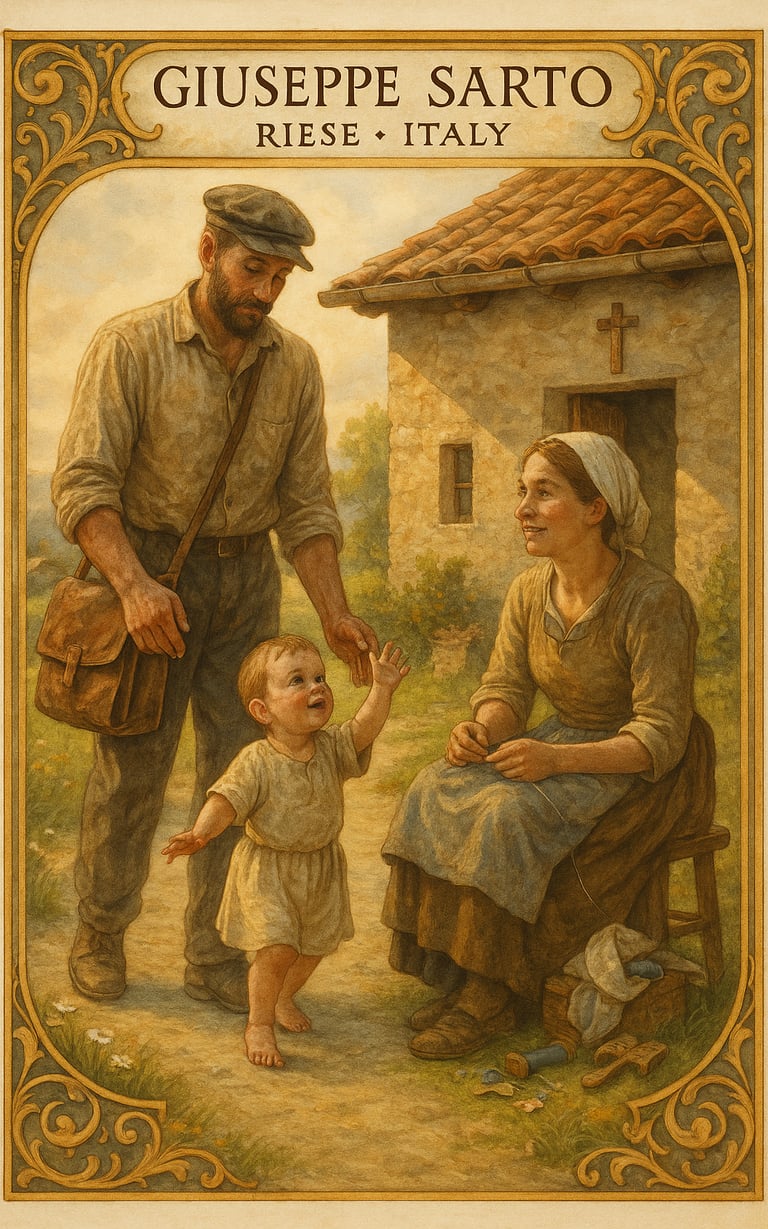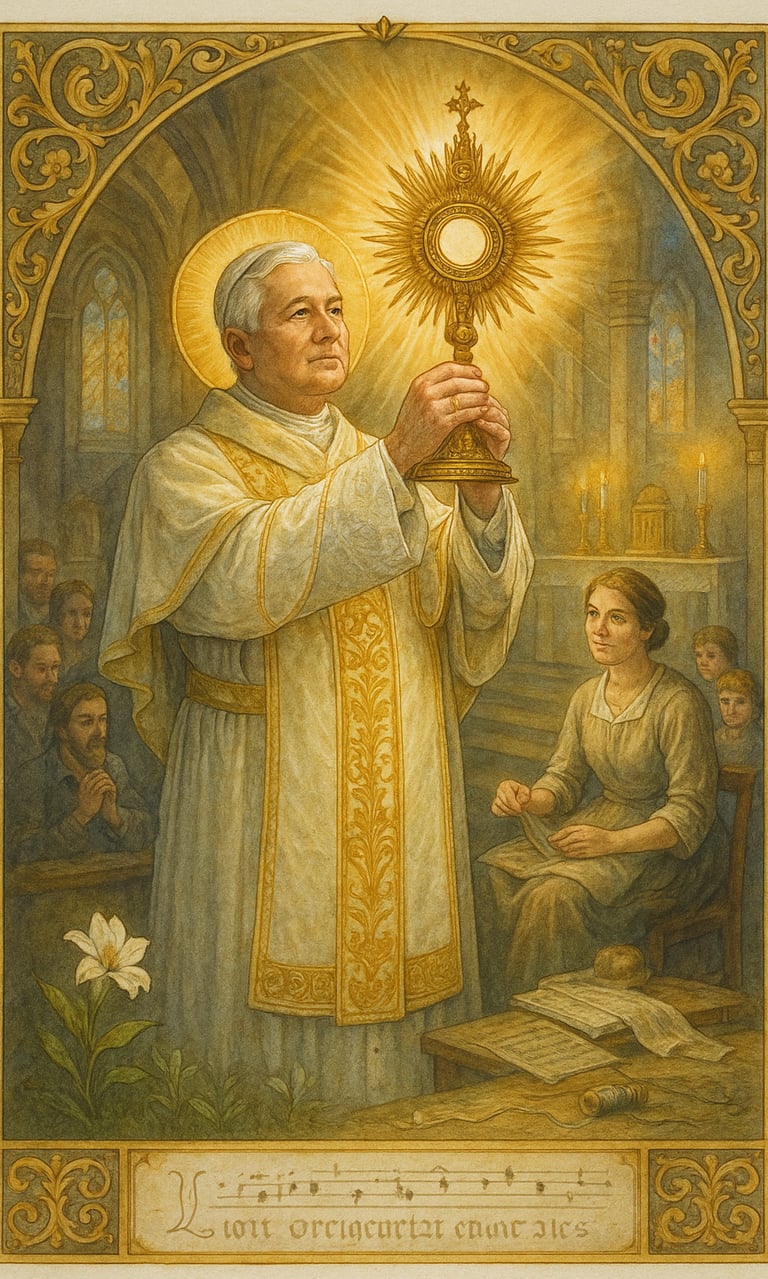Saint Pius X: The Pope of the Eucharist
Feast Day: August 21 | Patron of: First Communicants, Catechists, and Pilgrims
Halo & Light Studios
8/22/20253 min read


Click Link for a reel of Daily Dose of Saints and Faithful Art:
https://youtube.com/shorts/-7Cuzr9iVA4?feature=share
Friends in Christ, today we honor Pope St. Pius X (1835–1914), one of the most beloved popes of modern times. He is remembered as the Pope of the Eucharist, a humble man who rose from poverty to the papacy and steered the Church through turbulent waters.
Pius X was born Giuseppe (Joseph) Sarto in Riese, near Venice, the second of ten children in a poor family. His father was a village postman, his mother a seamstress. Despite hardship, his parents passed on a deep faith that formed their son. Young Giuseppe walked miles to school, studied late by candlelight, and eventually entered the seminary in Padua.
Ordained in 1858, he served as parish priest for years, remembered for his catechesis and tireless charity to the poor. He became bishop of Mantua in 1884, where he reformed seminaries and insisted that clergy live simply and pastorally. In 1893, Pope Leo XIII made him Patriarch of Venice and a cardinal. A decade later, in 1903, following the death of Leo XIII, Sarto was unexpectedly elected pope — taking the name Pius X.
From the beginning, he felt the weight of the office. Looking at the elaborate papal vestments, he sighed to a friend: “Look at how they have dressed me up. It is a penance.” At his installation, his mother kissed his papal ring, then held out her hand with her wedding ring, saying, “Son, you kiss my ring, because without it, you would not have yours.”
Pius X’s pontificate was guided by his motto: “Instaurare omnia in Christo” — “To restore all things in Christ.” His reforms touched nearly every corner of Catholic life:
-The Eucharist: He lowered the age of First Communion to about seven and encouraged frequent — even daily — reception of the Sacrament. He called the Eucharist the “shortest and safest way to Heaven.”
-The Liturgy: He restored Gregorian chant and sacred polyphony to pride of place, rejecting the intrusion of secular styles into worship. His 1903 motu proprio Tra le Sollecitudini remains a cornerstone of Catholic liturgical teaching.
-Scripture: He encouraged the daily reading of the Bible, affirming that the Word of God belongs to all the faithful, not just scholars.
-The Clergy: He reformed seminaries, insisting on fidelity to the Magisterium and strong priestly formation.
He also battled fiercely with anti-clerical governments, especially in France, which had stripped the Church of property and authority. Pius X endured the closure of religious schools and confiscation of churches, but he never ceased defending the rights of the Church and the freedom of worship.
Perhaps most prophetically, Pius X confronted Modernism, which he called “the synthesis of all heresies.” His encyclicals Lamentabili and Pascendi Dominici Gregis (1907) exposed its errors:
-That religion is mere imagination or sentiment, not revelation.
-That Christ is only a man, and miracles are myths.
-That all religions are essentially the same.
-That doctrine can change to suit culture.
-That Church teaching harms human progress.
-That marriage can be dissolved at will.
-That science always outranks faith.
A century ago, these ideas were just sprouting; today, they dominate secular culture. Pius X saw with piercing clarity that rejecting the supernatural meant rejecting God Himself.
Despite his firmness, he was known for gentleness and warmth. Historian Ludwig Pastor wrote: “He was one of those few people whose personality is irresistible. Everyone was moved by his angelic kindness. In his presence, there was a deep conviction of being face to face with a saint.”
His final years were marked by anguish. He longed to prevent the outbreak of World War I, but when war erupted in 1914, he was devastated, calling it “the suicide of civilized Europe.” He died only weeks after the first shots were fired, brokenhearted.
Canonized in 1954, Pope St. Pius X remains a towering figure in Catholic history: a pope who defended the faith, restored reverence to the liturgy, and gave the Church a deeper love for the Eucharist. His life is a witness that holiness, humility, and courage can guide the Church even in dark times.
“Holy Communion is the shortest and safest way to Heaven.” — St. Pius X


